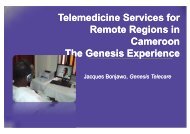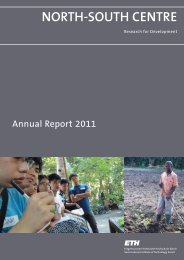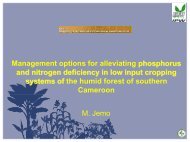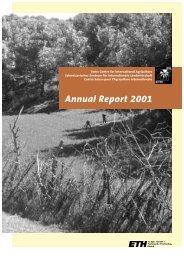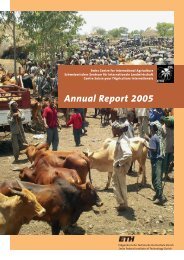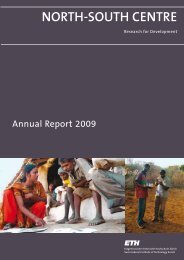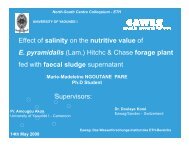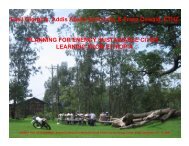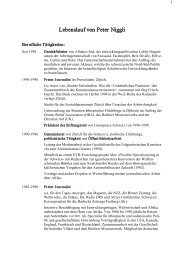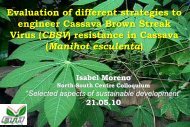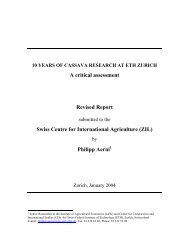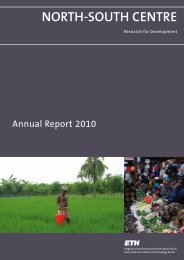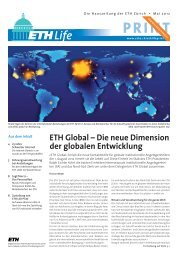Impact StudyThe development impact of ZIL research on livestocksystems: How targeted research can benefit the poorHow research might help people in developing countriesto escape the “poverty trap” is a question frequentlyasked by the public, the media and the politicians.The impact assessment survey covering ZIL’s programmephase IV (2003 – <strong>2006</strong>), dedicated to the research onlivestock systems in support of poor people, indeedidentified actual and potential pathways to translateresearch results into concrete suggestions to improve thelivelihoods of livestock smallholders.this way, it was possible to pinpoint the common featuresthat characterise the successes obtained and the difficultiesencountered. This led to a set of recommendations asspecific and realisable as possible.This chapter summarises the impact assessment studyand thereby demonstrates what a coherently focussedresearch programme is able to achieve in terms of developmentimpact.Following a context analysis that highlights the mainpotentials and challenges of livestock-keeping for smallholdersin developing countries, the measured and perceivedimpacts generated in each ZIL research projectwere identified using questionnaires and interviews withthe research teams and the co-operation partners. Thisinventory covered the factors influencing (positively andnegatively) the actual as well as the potential impactgeneration, both within the projects and on an institutionallevel.The process of impact generation was analysed, thusdetermining how knowledge generation, technologicalinnovation and capacity development can have a developmentalimpact while scientific rigor is maintained.The study examined the tools and strategies employed inorder to bridge the gap between the scientific results andtheir direct or indirect application by the beneficiaries. InThe process of impact generationThe “Livestock Revolution”A prerequisite for impact generation is the relevance of theresearch topic. The priority area chosen by ZIL in 2002focussing on livestock systems is of particular relevance for therural poor in developing countries, who face the simultaneouschallenges of marginalisation and environmental degradationin the context of rapid globalisation and urbanisation.According to the joint OECD-FAO agricultural outlook for 20<strong>07</strong> –2016, published in July 20<strong>07</strong>, the worldwide demand for animalsource foods (ASFs), in particular for meat, eggs and milk,will continue to rapidly increase in developing countries while16
Impact Studygrowing slowly or stagnating in industrialised countries. The“Livestock Revolution”, as this trend was defined when itemerged at the end of the 1990s, is determined by the globallyfast-growing middle classes who make their living in urbanand peri-urban areas and have new demands on food: Itshould contain more protein and micronutrients, be producedand marketed under hygienic conditions and take less time topurchase as well as to prepare.Parallel to the worldwide convergence of consumption patterns,the livestock production sector also shifts to developingcountries, the “Big Three” being Brazil, China and India.Livestock’s Long ShadowLivestock – in their numbers and in the present modes of production– enters direct competition for natural resources withhumans. It also contributes to climate change, land and forestdegradation as well as water and air pollution. According to“Livestock’s Long Shadow”, published by the FAO in November<strong>2006</strong>, livestock production presently generates more greenhousegas emissions (18 %) than transport does. It contributesPer capita consumption of livestock products 1966 – 2030(Source: FAO, 2005: Global and regional food consumption patterns and trends)to 70 % of dry land depletion and turned 70 % of previouslyforested land of the Amazon into pastures and feed crop fields.Livestock uses 8 % of the water needed by humans worldwide.Competing with wildlife and overexploiting other species forfeed (fish), it not only poses a threat to biodiversity but is alsoendangered itself in its genetic diversity as a consequence ofthe concentration on a few profitable breeds.Livestock remains a key asset for poor smallholders – but forhow long?Paradoxically, although it only generates 1.4 % of the world’s GDP,livestock is estimated to be an asset to one billion poor, i.e. the40 % of the world population who live on less than 2 USD per day.As a multi-purpose capital and revenue, livestock providesfood and raw material for all basic needs: draught power,income and savings, as well as employment. Poor smallholdersearn a larger proportion of their income from livestockthan wealthier farmers. Indeed, livestock is the only livelihoodoption for many poor who do not own land. This is particularlyimportant for women, since livestock-keeping requires noformal education and only few skills and investments.Additionally, livestock plays an important role in the social,cultural and religious life of (rural) societies in developingcountries.However, the economic changes of the last two decades inbreeding, keeping, trading and consumption of livestockproducts have unprecedented consequences for the ruralpoor. Because of the pressure on land resulting from theindustrialisation of production, processing and marketing,the poor are forced to resettle in less fertile and more remoteareas. This marginalisation leads, in turn, to a reduction in17
- Page 1 and 2: Swiss Centre for International Agri
- Page 3 and 4: Table of contentsZIL members. . . .
- Page 5 and 6: EditorialThe present Annual Report
- Page 7 and 8: An introduction to ZILThe ZIL proje
- Page 9 and 10: An introduction to ZILThe Progress
- Page 11 and 12: An introduction to ZILOn September
- Page 13 and 14: An introduction to ZILIn 2007, the
- Page 15: An introduction to ZILThe ZIL Execu
- Page 20 and 21: Impact Study18market opportunities
- Page 22 and 23: Impact Study20ral (N), human (H), f
- Page 24 and 25: ERA-ARDThe European Research Area i
- Page 26 and 27: ZIL research projectsOverviewLivest
- Page 28 and 29: ZIL research projectsIntegratedPest
- Page 30 and 31: ZIL research projectsEcosystemservi
- Page 32 and 33: ZIL research projectsLivestocksyste
- Page 34 and 35: ZIL research projectsLivestocksyste
- Page 36 and 37: ZIL research projectsLivestocksyste
- Page 38 and 39: ZIL research projectsLivestocksyste
- Page 40 and 41: ZIL research projectsLivestocksyste
- Page 42 and 43: ZIL research projectsLivestocksyste
- Page 44 and 45: Research Fellow Partnership Program
- Page 46 and 47: Research Fellow Partnership Program
- Page 48 and 49: Research Fellow Partnership Program
- Page 50 and 51: Research Fellow Partnership Program
- Page 52 and 53: Research Fellow Partnership Program
- Page 54 and 55: Research Fellow Partnership Program
- Page 56 and 57: Research Fellow Partnership Program
- Page 58 and 59: Research Fellow Partnership Program
- Page 60 and 61: Research Fellow Partnership Program
- Page 62 and 63: Research Fellow Partnership Program
- Page 64 and 65: Seed MoneySeed Money Projects 2003-
- Page 66 and 67: Other international projects of ZIL
- Page 68 and 69:
Teaching activities related to deve
- Page 70 and 71:
Development-related thesesSupervisi
- Page 72 and 73:
Development-related thesesSuperviso
- Page 74 and 75:
PublicationsPublications72Refereed
- Page 76 and 77:
PublicationsMathayya, S., Thankacha
- Page 78 and 79:
PublicationsVariaZIL funded project
- Page 80 and 81:
PublicationsRFPP projectsAbang, M.,
- Page 82 and 83:
PublicationsStupak, M., Alder, A.,
- Page 84 and 85:
PublicationsStickstoffumsatz und di
- Page 86 and 87:
PublicationsOther international pro
- Page 88 and 89:
Publicationssubandinen Waldweide-Sy
- Page 90 and 91:
ZIL members, collaborators and part
- Page 92 and 93:
ZIL members, collaborators and part
- Page 94 and 95:
AccountsAccounts 2006*Balance, Dece
- Page 96:
Swiss Centre for International Agri



